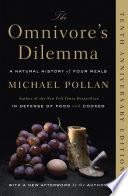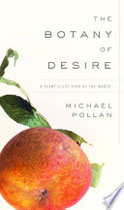Works

The Omnivore's Dilemma
Michael Pollan
The Botany of Desire
Michael PollanFood Rules: An Eater's Manual
Michael PollanCooked: A Natural History of Transformation
Michael PollanFamous Michael Pollan Quotes
Source: The Botany of Desire: A Plant's Eye View of the World
Source: Cooked: A Natural History of Transformation
Source: In Defense of Food: An Eater's Manifesto
Michael Pollan Quotes about food
“Culture, when it comes to food, is of course a fancy word for your mom.”
Source: In Defense of Food: An Eater's Manifesto
[Unhappy Meals, 2007-01-28, The New York Times Magazine, http://www.nytimes.com/2007/01/28/magazine/28nutritionism.t.html?ei=5090&en=a18a7f35515014c7&ex=1327640400&partner=rssuserland&emc=rss&pagewanted=print, 2007-01-28]
Michael Pollan Quotes about people
Source: Food Rules: An Eater's Manual
Source: The Botany of Desire (2001), Chapter 2 (p. 79)
Michael Pollan Quotes
“The family meal is the nursery of democracy.”
Context: It's [a kitchen/dining table] where we teach our children the manners they need to get along in society. We teach them how to share. To take turns. To argue without fighting and insulting other people. They learn the art of adult conversation. The family meal is the nursery of democracy.
“We forget how much time it can take simply to avoid cooking”
Context: We forget how much time it can take simply to avoid cooking: all that time spent driving to restaurants or waiting for our orders, none of which gets counted as 'food preparation'. And much of the half-hour saved by not cooking is spent watching screens.
Source: In Defense of Food: An Eater's Manifesto
Source: In Defense of Food: An Eater's Manifesto
“So that's us: processed corn, walking.”
Source: The Omnivore's Dilemma: A Natural History of Four Meals
Source: The Omnivore's Dilemma: A Natural History of Four Meals (New York: The Penguin Press, 2006), p. 333.
Context: The industrialization — and brutalization — of animals in America is a relatively new, evitable, and local phenomenon: No other country raises and slaughters its food animals quite as intensively or as brutally as we do. No other people in history has lived at quite so great a remove from the animals they eat. Were the walls of our meat industry to become transparent, literally or even figuratively, we would not long continue to raise, kill, and eat animals the way we do.
“When chickens get to live like chickens, they'll taste like chickens, too.”
Source: The Omnivore's Dilemma: A Natural History of Four Meals
“But that's the challenge -- to change the system more than it changes you.”
Source: The Omnivore's Dilemma: A Natural History of Four Meals
Source: The Omnivore's Dilemma: A Natural History of Four Meals
“Eating's not a bad way to get to know a place.”
Source: The Omnivore's Dilemma: A Natural History of Four Meals
Source: The Omnivore's Dilemma: A Natural History of Four Meals
The Omnivore's Dilemma: A Natural History of Four Meals (New York: The Penguin Press, 2006), p. 318.
[In Defense of Food: Author, Journalist Michael Pollan on Nutrition, Food Science and the American Diet, 2008-02-13, Democracy Now!, http://www.democracynow.org/2008/2/13/in_defense_of_food_author_journalist, 2009-04-15]
[Michael Pollan: Why the family meal is crucial to civilisation, Sat 25 May 2013, The Guardian, https://www.theguardian.com/lifeandstyle/2013/may/25/michael-pollan-family-meal-civilisation, 2018-05-23]
“Sometimes the cause of civilization is best served by a hard stare into the soul of its opposite.”
Source: The Botany of Desire (2001), Chapter 1, “Desire: Sweetness / Plant: The Apple” (p. 41)
Introduction “The Human Bumblebee” (p. xxi)
The Botany of Desire (2001)
Introduction “The Human Bumblebee” (p. xxi)
The Botany of Desire (2001)
